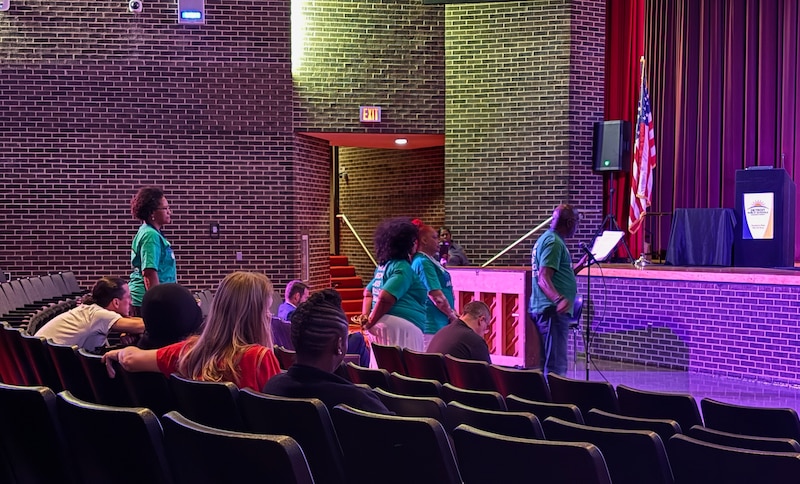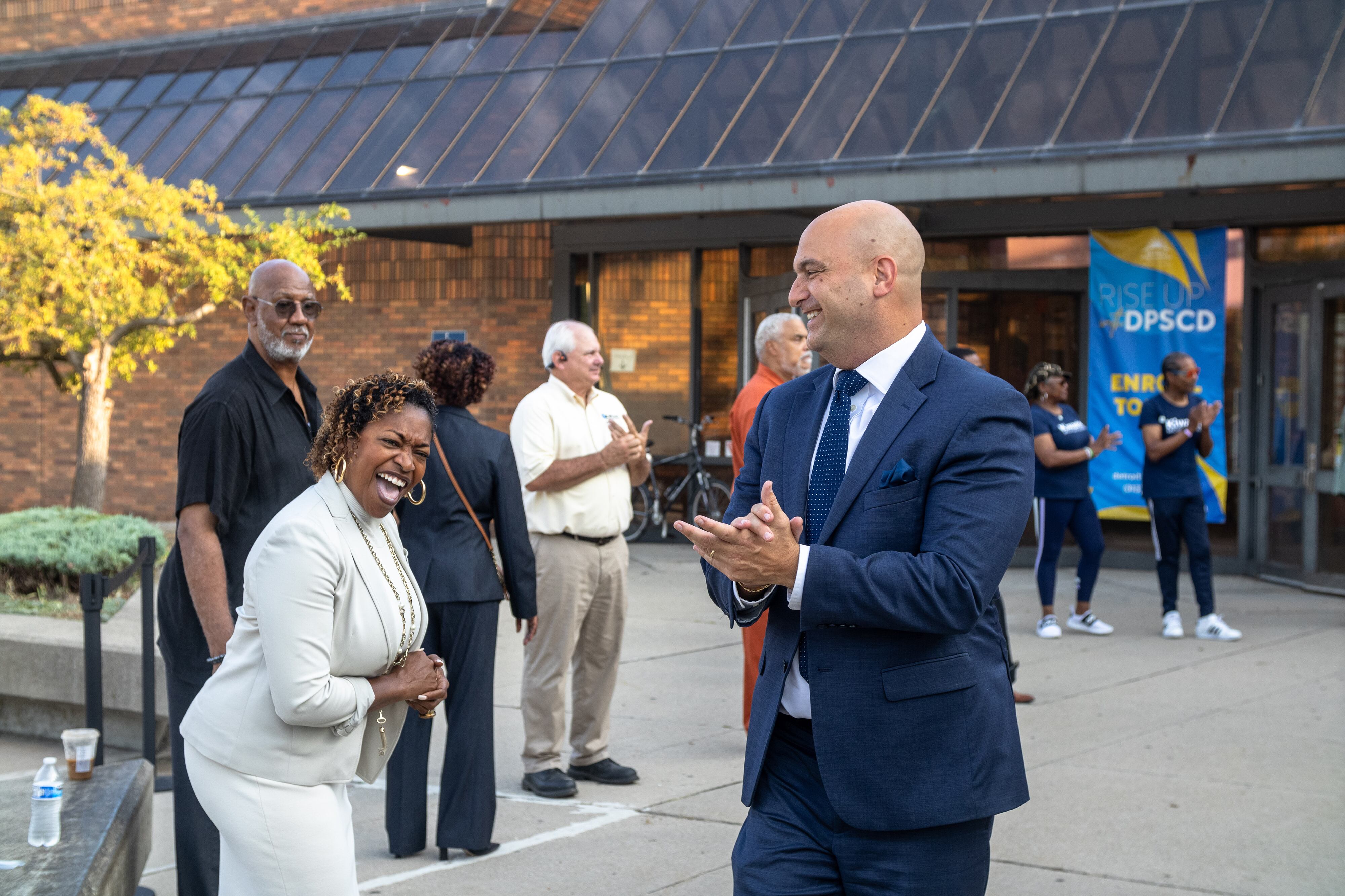Detroit public school students returned to the classroom late last month, and early data shows encouraging enrollment numbers for the district.
Detroit Public Schools Community District Superintendent Nikolai Vitti said during Tuesday’s school board meeting that 53,044 K-12 students are enrolled. That’s up from the 51,600 students recorded around this time last year, and the 52,300 students enrolled in DPSCD in 2022.
“As of the tenth day (of school), 90% of students enrolled have attended at least once,” he said. “That means 47,540 (students). That number is higher than the last three years and, namely, 1,222 students higher than last year.”
However, Vitti remains cautiously optimistic as the district will have a more accurate enrollment figure following Student Count Day on Oct. 2, he said.
Each year, DPSCD shares enrollment and attendance data from the first couple weeks of the new school year. Those figures provide an early snapshot of enrollment patterns ahead of Michigan’s two official Count Days, in October and February, when the number of students attending school is tallied for the purposes of allocating state funding.
Improving student attendance and enrollment has been a priority for officials in DPSCD and districts across Michigan, especially in recent years given the impact of the COVID-19 pandemic.
To gain a better understanding of students enrolled, district officials as of Tuesday stopped counting students who have not attended class this year, Vitti said. DPSCD has provided neighborhood schools and the Paul Robeson Malcolm X Academy with additional funding for door-to-door canvassing in an effort to get more students to come to class. K-5 teachers also will have the opportunity to phone bank and call no-show students.
DPSCD’s literacy efforts highlighted
As part of the district’s three-year plan to spend $94.4 million in its “right to read” lawsuit settlement money, DPSCD hired 200 academic interventionists, Vitti said at Tuesday’s meeting.
The plan, which was approved in June, seeks to address disparities such as literacy rates, which indicate that students are not getting the foundational skills they need. In the spring of 2023, 24.7% of students read three levels below their grade, while only 13.5% of students could read at grade level. The plan includes enhanced literacy intervention in core and small group instruction, increased support for immigrant students, and resources to expand learning at home.
Vitti also discussed the district’s performance on the 2024 Michigan Student Test of Educational Progress, also known as M-STEP. The results for the statewide exam were released last month.
Vitti said the district’s improvement at and above grade level in literacy and math exceeded the state average, Detroit’s charter school average, and Wayne County’s average.
“This just builds off of a study (from earlier this year) conducted by Harvard and Stanford that indicated that DPSCD is showing more improvement in at or above grade-level performance than the state of Michigan, than suburban school districts in Michigan, even large urban school districts,” he said. “We know we haven’t arrived, but certainly we’re on the path of improvement.”
Vitti recognized schools that had the highest achievement in English language arts, math, science, and social studies according to M-STEP, PSAT, and SAT results from the 2022-23 school year.
For the 2023 M-STEP, DPSCD students made small improvements in reading across grade levels, in most cases exceeding pre-pandemic results. In third grade, 12.4% of DPSCD students scored proficient or higher in 2022-23, compared with just 9% the previous year, and 11.9% in 2018-19. Fifth grade reading results remain below pre-pandemic levels, but improved a bit from 2022.
The top five elementary/middle schools performing at or above grade level in ELA include:
- Bates Academy
- Chrysler Elementary
- Edmonson Montessori
- Foreign Language Immersion and Cultural Studies School (FLICS)
- The School at Marygrove
The top five high schools proficient in literacy are:
- Cass Technical High School
- Renaissance High School
- The School at Marygrove
- Detroit School of Arts
- DPSCD Virtual School
Ray Hart, executive director of the Council of the Great City Schools, announced the unveiling of a new school library for students and staff at Mason Academy, complete with a donation of new books. The renovation is part of the Richard M. Robinson Literacy Champion Award, which DPSCD won earlier this year. Named after the late Scholastic chairman and CEO, the annual award recognizes a CGCS member school district that has made demonstrated progress in advancing reading achievement.
Tai Chapman, an executive at Scholastic, said reading can teach children about themselves and what they wish to aspire to.
“It was very important for us to create a setting that was not only a learning environment, but that was a community platform that everyone could enjoy,” she said about the library.
AFSCME workers demand raise
During the public comment portion of the board meeting, members of Local 345 of the American Federation of State, County, and Municipal Employees called for a higher wage for its paraprofessionals. Executive Vice President Tina Galloway, sporting a green AFSCME T-shirt, said paraprofessionals often have to work two or three jobs and go to the food bank to make ends meet.
“Yes, we have doors open to other districts to go out and service those children, but we choose to stay in our community to serve our children,” Galloway said. “It’s a slap in the face. We are CNAs (Certified Nursing Assistants), we are security guards. We change diapers, we do all of this stuff but you guys don’t value us. We are the foundation that holds this district together.”

According to the employment website Indeed, paraprofessionals in Michigan make an average of $16.28 per hour, or $33,876 annually. AFSCME Local 345 President Michelle Lee told BridgeDetroit the paraprofessionals at DPSCD make $16.80 an hour, with the pay bump implemented last November. Meanwhile, surrounding school districts pay paraprofessionals $20 an hour or more, she said.
Lee, who is a paraprofessional at the Charles R. Drew Transition Center and has worked with adults with disabilities for 20 years, said she and her colleagues just want a living wage. Most of Lee’s paycheck goes toward rent.
“We just want something where we can obtain a life where we’re not struggling,” she said. “People can’t even retire because their pension is nothing, so they have to come back to work. Or you’ve had people who passed away on the job; they can’t afford to quit.”
In 2021, AFSCME and DPSCD agreed to a two-year deal that increased hourly wages to roughly $15 to $17.66 for the union’s district employees, who include trainable aides, custodians, bus attendants, and food service workers.
With that contract ending in June, the union is at the bargaining table with DPSCD once again. Lee hopes to have a contract similar to the one that was approved for the Detroit Federation of Teachers earlier this summer. The agreement included pay increases for new and veteran educators as well as bonuses for special education and mental health employees.
Lee hopes wages can rise to $20 an hour, with veteran paraprofessionals making at least $25. She also wants the ability to file for unemployment during the summer months.
“It’s not like this is some easy job. We have to be very attentive,” Lee said. “You have to be one of God’s children to do this job here. We want to be compensated for what we do because we have families of our own. We want to live the American dream, too.”
Micah Walker is a reporter for BridgeDetroit. You can reach her at mwalker@bridgedetroit.com.







